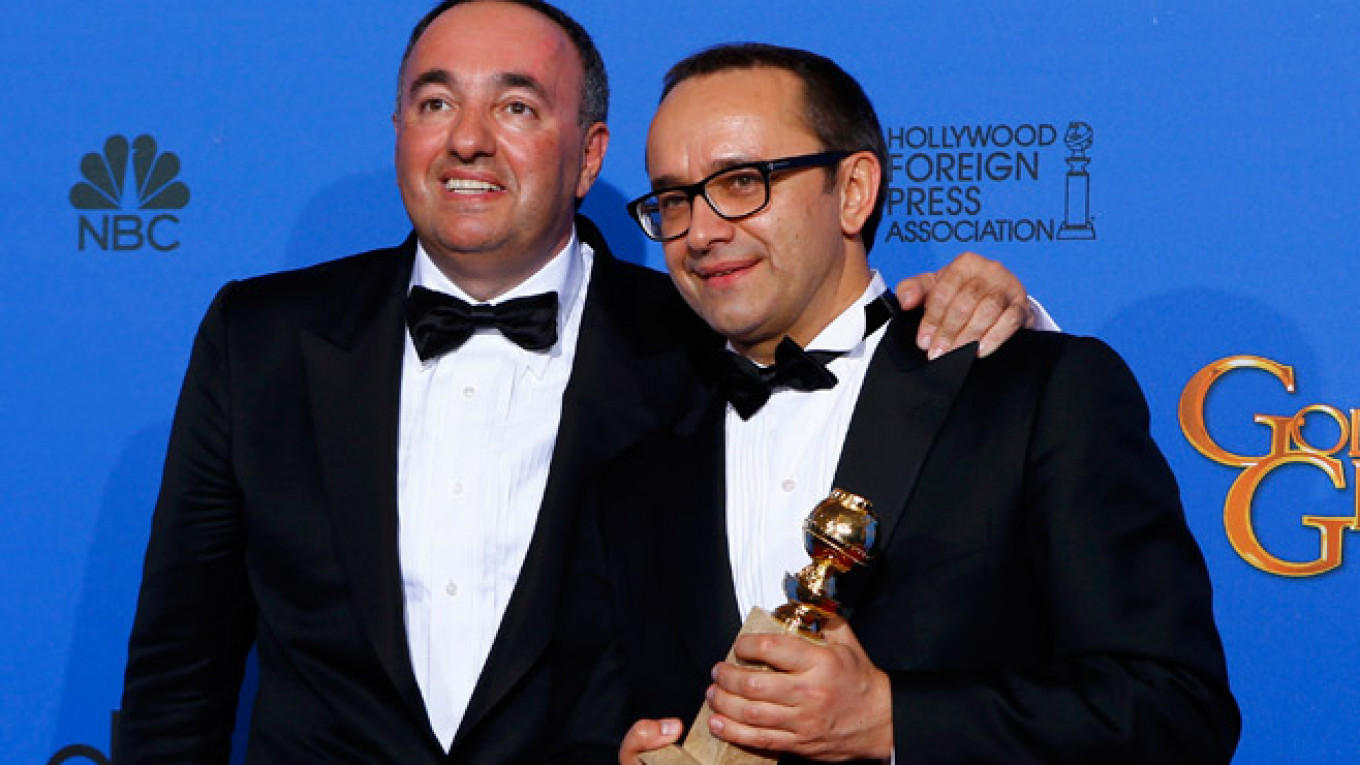"Of course! Of course "Leviathan" would get a Golden Globe and an Oscar nomination! It's a depressing, hopeless portrait of Russia! Everyone knows that Americans love depressing, hopeless portraits of Russia even more than they love McNuggets and pickup trucks!"
This is what many ordinary Russians are basically saying about Andrei Zvyagintsev's latest film — and they are in good company.
It is a powerful fable of stupefying injustice that people everywhere can relate to.
Russia's own Culture Minister, Vladimir Medinsky, has just slammed Zvyagintsev for being motivated solely by an alleged love of "fame, red carpets and [Oscar] statuettes," and complained that directors who criticize the government too much are, in fact, "disrespecting the choice of the taxpayers."
The notion that Americans and Westerners in general are desperate to reward art that denigrates Russia is very popular. I've seen it expressed long before the current uproar over "Leviathan," which is happening in the context of anger at Western sanctions.
Russian documentary filmmakers who made movies about marginalized members of society, for example, have regularly been accused of catering to festival juries eager to tarnish Russia's image.
Having worked in the media for years, I can honestly say that weird and ridiculous stories about Russia do reach a wider audience, simply because weird and ridiculous stories from "exotic" locations always reach a wider audience. A headline such as "Nothing Unusual Happened in Saratov Today" doesn't stand a chance against something like "A Posse of Kalashnikov-Toting Naked Babushkas Robbed a Vodka Distillery in Saratov Today."
Naturally, stories that conform to stereotypes — whether they're about drunk Russians or scary Arabs — do get more play, and the same holds true for Russian media stories that reinforce local stereotypes.
Such rules, however, fall apart when you try to apply them to festival juries or film awards. "They're just not that into you" is what I like to say to Russians who imagine how Western critics staying up all night scouring the Internet Movie Database for films that portray Russia as anything other than a paradise.
In fact, extremely disturbing Russian films rarely get a lot of notice abroad, because people can't relate to them. That's the reason why the work of Alexei Balabanov, whose "Cargo 200" is one of the most terrifying movies about Russia ever made, didn't get that much attention abroad outside of Rotterdam. The context of Balabanov's work was too specific.
So what is the real reason as to why Zvyagintsev's "Leviathan" is succeeding where "Cargo 200" failed? As critic Alyona Solntseva recently argued on the Gazeta.ru news site, some of the reasons are circumstantial.
Due to the Ukraine crisis, Russia is in the news a lot more than it used to be. This automatically makes the work of a Russian director stand out more than usual.
There is also the fact that Zvyagintsev is a perfectionist. "Leviathan" is not just a good movie — it's a well-made movie, where everything from editing to sound is treated with exceptional care. Such attention to detail is still fairly rare for Russian cinema, with lack of private funding probably being the biggest culprit. The bureaucratic machine ostensibly meant to support Russian filmmakers forces them to spend more time ticking boxes as opposed to polishing their films.
The biggest reason why "Leviathan" has gained recognition abroad has to do with the fact that at its heart it is a powerful fable of stupefying injustice that people everywhere can relate to. The film also does a good job of dismantling the myth of the macho superhero, which has generated fatigue among critics in recent years.
At its core, "Leviathan" is a story of an ever-present monster. The monster is as oppressive as it is elusive — it is in the air, in the soil, in the indifferent landscape, in court verdicts and clerical speeches that act upon the conscience in the manner of dark magic spells. People who have never set foot in Russia can respond to the irresistibly atmospheric nature of this story, where piercing human tragedy is muted and co-opted by bureaucracy.
There is a strange irony in seeing Russian officials set upon Zvyagintsev while loudly denying that a movie about a similarly embattled individual has nothing to do with reality.
It is equally strange to watch people insist that Zvyagintsev is a soulless attention seeker who loves nothing besides getting awards. The performances he gets his actors to give on screen should alone refute that.
I suppose that one of the most convenient things about the backlash against the movie is the opportunity for the Culture Ministry to explain why most of its lavishly financed film projects don't find an audience abroad. It's got nothing to do with quality, you see! It's just that conniving Western critics can't stand patriotic Russian cinema!
But the years will go by and Zvyagintsev will take his rightful place in the Russian film canon. The people who slandered him while being unable to produce lasting works of art themselves will be reduced to annoying footnotes at best.
And perhaps they know it already, hence their bitter rage.
Natalia Antonova is an American playwright and journalist.
A Message from The Moscow Times:
Dear readers,
We are facing unprecedented challenges. Russia's Prosecutor General's Office has designated The Moscow Times as an "undesirable" organization, criminalizing our work and putting our staff at risk of prosecution. This follows our earlier unjust labeling as a "foreign agent."
These actions are direct attempts to silence independent journalism in Russia. The authorities claim our work "discredits the decisions of the Russian leadership." We see things differently: we strive to provide accurate, unbiased reporting on Russia.
We, the journalists of The Moscow Times, refuse to be silenced. But to continue our work, we need your help.
Your support, no matter how small, makes a world of difference. If you can, please support us monthly starting from just $2. It's quick to set up, and every contribution makes a significant impact.
By supporting The Moscow Times, you're defending open, independent journalism in the face of repression. Thank you for standing with us.
Remind me later.








